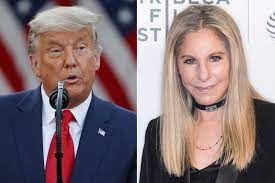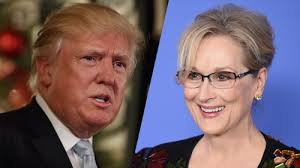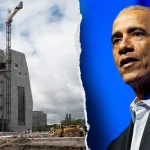“TURN OFF THE MONEY MACHINE, JEFF.” — The Night Barbra Streisand Stood Up to Power 🌪️✨
- MinhKhue
- November 6, 2025

The lights of Los Angeles glittered like a restless sea that evening, but all eyes — and cameras — were fixed on one woman standing beneath a single golden spotlight.
Barbra Streisand, at 83 years old, still carried the kind of presence that could silence a room without saying a word. But that night, she didn’t come to sing. She came to speak.
It was during a live broadcast at a global arts and leadership gala, streamed across networks and platforms worldwide. The evening had been full of predictable speeches — celebrities thanking sponsors, CEOs talking about “innovation” and “inclusion.” Then Barbra took the stage.
 Her voice, calm but unflinching, cut through the polite applause:
Her voice, calm but unflinching, cut through the polite applause:
“TURN OFF THE MONEY MACHINE, JEFF.”
The audience froze. For a split second, no one knew what she meant — until she continued.
“I can’t, in good conscience, allow my music to sit on a platform that profits from corruption, that funds the very people who divide this country.”
The name Jeff hung in the air like a thunderclap. She was talking about Jeff Bezos — and by extension, Amazon — the empire she accused of quietly supporting policies that enriched the few while endangering democracy.
“I’ve decided,” she said, her tone steady, “to remove my music from Amazon. Not because I want attention, but because silence is complicity. This isn’t about politics — it’s about principle. If you stand with corruption, you stand against art.”

The crowd erupted. Some cheered. Some gasped. The cameras zoomed in on her expression — not rage, but resolve.
Within minutes, the news hit every corner of the internet.
#BarbraStreisand was trending worldwide.
Donald Trump, never one to stay silent, took to Truth Social:
“A washed-up diva looking for relevance.”
But Streisand didn’t flinch. A few hours later, she responded with just three sentences on her social media account:
“I don’t need relevance. I need integrity. Art should never serve power — it should speak truth to it.”
By morning, the entertainment industry was in chaos. Analysts on CNBC called it “the Streisand quake.” Amazon’s music division faced a wave of backlash and speculation. Fans flooded platforms with messages of support: “Barbra just did what no one else dared.”

Behind the headlines, something deeper was happening. Artists who had once stayed quiet out of fear — fear of losing contracts, exposure, or fans — began speaking up too. A Grammy-winning songwriter posted, “If Barbra can stand up, so can I.” A major streaming executive resigned, citing “ethical differences.”
Whether people agreed with her or not, Streisand had reignited an ancient truth: art is not just entertainment — it’s conscience.
In the days that followed, reporters camped outside her Malibu home. She didn’t appear. But in a quiet interview with a journalist from The Guardian, she finally reflected on that night:
“I’ve sung for presidents and kings. I’ve seen empires built on greed. But at the end of the day, all I’ve ever wanted is to leave the world a little kinder, a little fairer — even if that means losing a few songs along the way.”

That quote went viral — not as a political statement, but as a human one.
In the weeks after her stand, universities hosted panels on “Art and Responsibility in the Age of Power.” Musicians began reevaluating their partnerships. Even politicians — some quietly, some publicly — acknowledged that the lines between business, art, and ethics had been redrawn.
Barbra Streisand didn’t topple empires that night. But she cracked their mirrors — forcing them, and all of us, to look at what we value most: convenience or conscience.
As one young fan wrote beneath her post:
“She didn’t retire from music. She just turned it into a revolution.” 🎶🔥











